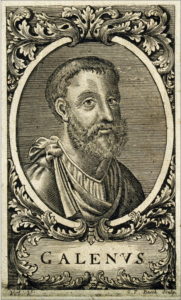130 C.E. – 217 C.E. Galen
 Moses and Greeks, Christians, Judaean Medical Treatment
Moses and Greeks, Christians, Judaean Medical Treatment
The illustrious physician of the ancient world was born in Pergamum (e.g. modern day Turkey), and stayed in several of the great Jewish centres, including Smyrna, Alexandria and Rome. He also visited “Palestine.” Galen does not allot any special place to the Jews in his works, but mentions them, like the Christians, mainly to exemplify a certain cast of mind which he considers does not conform to that of the true scientist and philosopher. Five passages in which Judaism is referred to expressly have been traced in the works of Galen. Three are to be found in his extant Greek works: one in De Usu Partium Differentiis. Two other passages have been recovered from Arabic translations. The most elaborate passage is that in De Usu Partium (No. 376), a work composed between 169 and 176 C.E., roughly contemporaneous with the Άληϑής Λόγος of Celsus (No. 375). The reference constitutes a criticism of the Mosaic cosmogony… For Moses, it was sufficient to say that God willed the arrangement of matter, while the Greeks think that certain things are physically impossible and that God only chooses the best out of the available possibilities.
Galen’s four other references to the Jews bear mainly on two features that characterize them, common to both Jews and Christians. These are acceptance of everything on faith and obstinate loyalty to their doctrine. Two of the passages derive from De Pulsuum Differentiis. They occur in connection with Galen’s criticism of Archigenes, a famous physician of the former generation, for having associated eight qualities with the pulses without giving any proofs for this statement (No. 377).
Galen makes several references in his works to the Dead Sea. He stresses the beauty of the asphalt of the Dead Sea and points out its medicinal qualities. The medical use for what is called the “Judaean Stone.” Galen doubts whether it is of much help to the bladder, for which, it is commonly used, but he finds it good for the kidneys.
Moses
De Usu Partium, XI, 14
…It is precisely this point in which our own opinion and that of Plato and of the other Greeks who follow the right method in natural science differs from the position taken by Moses. For the latter it seems enough to say that God simply willed the arrangement of matter and it was presently arranged in due order; for he believes everything to be possible with God, even should He wish to make a bull or a horse out of ashes. We however do not hold this; we say that certain things are impossible by nature and that God does not even attempt such things at all but that He chooses the best out of the possibilities of becoming…
Moses and Christ
De Pulsuum Differntiis, III, 3
One might more easiy teach novelties to the followers of Moses and Christ than to the physicians and philosophers, who cling fast to their schools. So that at the end I determined to spare myself much idle talk by not discussing anything at all with them.
Jewish Medicine/ Kidney Stones/ Bladder Stones
De Simplicium Medicamentorum Temperamentus ac Facultatibus, IX, 2:5 ― F86 R
There is another, more powerful, stone produced in Syria Palaestina, white-coloured, and well-proportioned in form, which has lines as though made by a turning-lathe. It is called “the Judaean” after the land in which it is produced. They use it against stones of the bladder, dissolving it on a whetstone, and moistening it with three cyathi of hot water. However, in the cases in which we tried it it accomplished nothing against the stones in the bladder but it is effective for those adhering to the kidneys.
Source: Menahem, Stern. Greek and Latin Authors on Jews and Judaism, Volume II (# 376, 378, 383)



